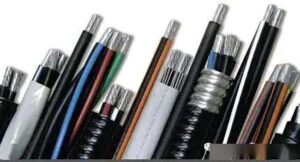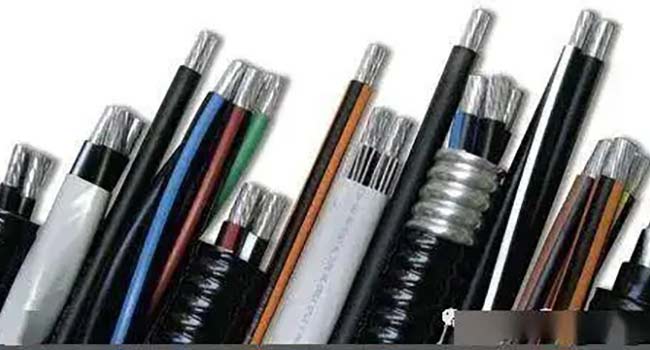ما هو العزل?
يعد عزل الكابل جزءًا مهمًا من أي كابل. وهي مصنوعة من مادة غير موصوفة تغطي السلك. ومن المعروف أيضًا باسم العزل الكهربائي.
الغرض من العزل هو فصل التيار عن بقية الكابل, إبقائه داخل السلك ومنعه من دخول البيئة المحيطة.
في نفس الوقت, العزل يحمي السلك من الظروف القاسية في بيئة التثبيت ويضمن تشغيله المناسب.
يمكن تصنيع العزل من مواد مختلفة, اعتمادًا على تطبيق الأسلاك المستهدف.
لكن عموما, البلاستيك, ممحاة, والبوليمرات الفلورية هي أكثر أنواع عزل الأسلاك شيوعًا.

العزل البلاستيكي
كلوريد البولي فينيل (بولي كلوريد الفينيل)
كلوريد البولي فينيل مقاوم للرطوبة, نار, والتآكل ويمكن استخدامه في العديد من البيئات. على سبيل المثال, الأحماض, المذيبات, والأوزون.
الكابلات المعزولة PVC ليس لها أيضًا طعم أو رائحة, لذلك فهي ليست سامة. نطاق درجة الحرارة المسموح به لهذه المادة هو -55 درجة مئوية إلى 105 درجة مئوية.
شبه صاخب (ريال) بولي كلوريد الفينيل
SR-PVC لديه خصائص مقاومة مماثلة ل العزل PVC, لكن هذه المادة أفضل عندما تكون أقصى مقاومة التآكل أولوية.
بقيت PVC
PVC Lechainum PVC مصنوع أيضًا من PVC, ولكن هو الأنسب للتركيب في المناطق الداخلية مع تداول الهواء, مثل الأرضيات المرتفعة أو الأسقف المتساقطة.
البولي ايثيلين (بي)
البولي إيثيلين عبارة عن مادة صلبة تستخدم عندما تكون هناك حاجة إلى سرعات انتقال عالية وسعة منخفضة.
البولي إيثيلين هو أيضًا الخيار المفضل لعزل الكابل المحوري. هذه المادة مقاومة للحام, تكسير, والمذيبات, ويعمل في درجات حرارة تتراوح بين -65 درجة مئوية و 80 درجة مئوية.
XLPE (البولي إيثيلين المتقاطع) العزل هو نوع فرعي شائع لعزل البولي إيثيلين.
البولي بروبيلين (ص)
يحتوي PP على خصائص مماثلة لـ PE ولكنه يستخدم بشكل أساسي في البيئات الداخلية. نطاق درجة الحرارة المسموح به لهذا العزل هو 30 درجة مئوية إلى 80 درجة مئوية.
البولي يوريثان (بور)
PUR هي مادة مرنة تستخدم بشكل أساسي للكابلات في بيئات درجات الحرارة المنخفضة والبحرية. إنه مقاوم للرطوبة, المواد الكيميائية, والتآكل ولديه نطاق درجة حرارة التشغيل من -60 درجة مئوية إلى 90 درجة مئوية.
عزل المطاط
المطاط بالحرارة (TPR)
TPR مقاوم لدرجات حرارة عالية وظروف الطقس القاسية وهو الخيار الأفضل عندما تكون سرعات المعالجة العالية مطلوبة.
النيوبرين (بولي كلوروبرن)
النيوبرين مقاوم للتآكل, زيت, والمذيبات. هذه المواد العازلة تجعل الأسلاك متينة.
المطاط الإيثيلين بروبيلين (إي بي آر)
يستخدم EPR على نطاق واسع في الكابلات عالية الجهد – إنه مرن ومقاوم لمعظم المهيجة. نطاق درجة الحرارة المسموح به لعزل كابل EPR هو -50 درجة مئوية إلى 160 درجة مئوية.
مونومر الإيثيلين-بروبيلين ديين (EPDM)
EPDM مقاوم للظروف الجوية القاسية, الحرارة والتآكل, بالإضافة إلى كونه عازلًا كهربائيًا قويًا ومرنًا. نطاق درجة حرارة التشغيل هو -55 درجة مئوية- إلى 50 درجة مئوية.
السيليكون
السيليكون صناعي مرن يستخدم على نطاق واسع مادة عزل المطاط. هذه المادة مفيدة بشكل خاص في مناطق الحرارة العالية حيث يمكنها تحمل درجات حرارة تصل إلى 180 درجة مئوية.
الألياف الزجاجية
الألياف الزجاجية مقاومة للرطوبة والمواد الكيميائية.
هذا العزل الزجاجي لديه أقصى درجة حرارة تشغيل تبلغ 482 درجة مئوية وغالبًا ما تستخدم في الأفران, معالجة الألومنيوم, والمعالجة الحرارية.
المطاط الستايرين-بيوتاين (SBR)
SBR له خصائص مماثلة للنيوبرين ولكن يستخدم بشكل أساسي في كابل MIL-C-55668.
مواد عزل الفلور
alkoxy perfluorinated (PFA)
PFA هو قوي و, لذلك, مواد عازلة متينة يمكن استخدامها في درجات الحرارة القصوى (من -65 درجة مئوية إلى 250 درجة مئوية).
polytetrafluoroethylene (بتف)
polytetrafluoroethylene هي مادة مرنة مرنة هي الحرارة, زيت, رُطُوبَة, والمقاومة الكيميائية.
نطاق درجة الحرارة المسموح به لهذه المادة هو -70 درجة مئوية إلى 205 درجة مئوية.
الايثيلين البروبيلين المفلور (محطة إثراء الوقود)
عادة ما يتم استخدام FEP في السترات السفلية والكابلات العسكرية بسبب مقاومة اللهب العالية وقدرات نقل البيانات الممتازة.
الفلورايد polyvinylidene (PVDF)
يُعرف PVDF أيضًا باسم Kynar – إنه مقاوم لمعظم المهيجة, بما في ذلك اللهب. كما أنها مرنة وليست ثقيلة, مما يجعلها مناسبة تمامًا للبيئات الداخلية التهوية.
اختيار عزل الكابل المناسب
يعتمد نوع العزل الذي تختاره على سيناريو تطبيق الكابل الخاص بك. في كابلات Veri, لدينا أنواع مختلفة من الكابلات مع عزل الموصل الألمنيوم والنحاس. على سبيل المثال, بعض منتجاتنا الأكثر شعبية هي أسلاك الألومنيوم منخفضة الجهد مع عزل PVC و كابلات النحاس المتوسطة والعالية الجهد مع عزل XLPE. اتصل بنا للحصول على أحدث كتالوجنا, شاهد المزيد من المنتجات وابحث عن السلك والكابل الذي تحتاجه لمشروعك.
